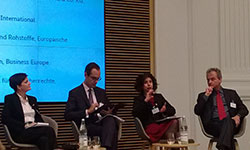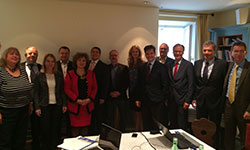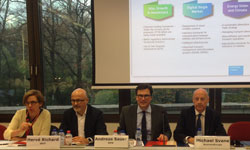BusinessEurope Headlines No. 2015-36
Completing Capital Markets Union is key to long-term EU investment
 Capital markets are fragmented and regulated differently across the EU. This is a problem as it hinders cross-border capital flows. We must urgently implement many of the excellent proposals in the European Commission’s Capital Markets Union action plan if we are to put the EU economy firmly on the path of an investment-led, sustainable growth. This was the message delivered by BusinessEurope Director General Markus J. Beyrer at the Tatra summit on 5 November in Bratislava. Speaking at a panel discussion on ‘Boosting Investment in Europe: Building Capital Markets Union’, Beyrer reminded participants that Europe also needs to remove other barriers to investment, including completing the single market, improving regulation and reducing the cost of doing business, if it is to raise investment levels.
Capital markets are fragmented and regulated differently across the EU. This is a problem as it hinders cross-border capital flows. We must urgently implement many of the excellent proposals in the European Commission’s Capital Markets Union action plan if we are to put the EU economy firmly on the path of an investment-led, sustainable growth. This was the message delivered by BusinessEurope Director General Markus J. Beyrer at the Tatra summit on 5 November in Bratislava. Speaking at a panel discussion on ‘Boosting Investment in Europe: Building Capital Markets Union’, Beyrer reminded participants that Europe also needs to remove other barriers to investment, including completing the single market, improving regulation and reducing the cost of doing business, if it is to raise investment levels.
Contact: James Watson
Photo copyright: Tatra summit, 2015
Ensuring a responsible and sustainable raw materials sector
 Promoting responsible and sustainable practices in the sector of raw materials is crucial and European businesses recognise their societal role, especially when operating under challenging conditions. This is what Luisa Santos, International Relations Director at BusinessEurope, supported in her address at the international raw materials conference in Berlin on 10 November. Raw materials remain a key but sensitive sector, often associated with broader conflicts and social problems. Although trade policies can contribute to solving these problems, they need to be part of comprehensive, global solutions where governments, the private sector and civil society come together in partnerships.
Promoting responsible and sustainable practices in the sector of raw materials is crucial and European businesses recognise their societal role, especially when operating under challenging conditions. This is what Luisa Santos, International Relations Director at BusinessEurope, supported in her address at the international raw materials conference in Berlin on 10 November. Raw materials remain a key but sensitive sector, often associated with broader conflicts and social problems. Although trade policies can contribute to solving these problems, they need to be part of comprehensive, global solutions where governments, the private sector and civil society come together in partnerships.
Contact: Sofia Bournou
Director General Beyrer met Central and Eastern European industry and employer federations
 “A strong regional cooperation between equal partners in Europe is of mutual benefit for each of the countries concerned and for our continent as a whole”, BusinessEurope Director General Markus J. Beyrer said at the meeting of the Central and Eastern European (CEE) industry and employer federations initiative on 6 November in Salzburg, Austria. Beyrer also underlined that industry is the backbone of economy and this needs to be actively safeguarded on all levels, both in the CEE region and in Europe as a whole. The CEE initiative consists of BusinessEurope member federations from Austria, the Czech Republic, Hungary, Slovakia, Slovenia, Croatia and Bulgaria. The group, which celebrated its 10th anniversary in Salzburg, aims at stronger regional cooperation by promoting growth and competitiveness.
“A strong regional cooperation between equal partners in Europe is of mutual benefit for each of the countries concerned and for our continent as a whole”, BusinessEurope Director General Markus J. Beyrer said at the meeting of the Central and Eastern European (CEE) industry and employer federations initiative on 6 November in Salzburg, Austria. Beyrer also underlined that industry is the backbone of economy and this needs to be actively safeguarded on all levels, both in the CEE region and in Europe as a whole. The CEE initiative consists of BusinessEurope member federations from Austria, the Czech Republic, Hungary, Slovakia, Slovenia, Croatia and Bulgaria. The group, which celebrated its 10th anniversary in Salzburg, aims at stronger regional cooperation by promoting growth and competitiveness.
Contact: Dominik Futschik
Support digitalisation of transport to increase efficiency and reduce costs
 With the demand for transport services set to increase in the next decades, linked to the rise of e-commerce and intensified global trade, it is crucial to improve the efficiency of logistics and supply chains. To do so, Europe must fully grasp the huge benefits digital technology can offer, Michael Svane, Chairman of BusinessEurope’s Transport Working Group, stressed at a high-level European Commission conference on the future of transport on 12 November. To really allow e-transport documents, big data, digital tools and ICT solutions to make the life of companies easier, reduce costs and create new opportunities, a number of important challenges need to be addressed, from the lack of interoperability and investment in smart infrastructure to regulatory obstacles. It is essential that regulators take a balanced approach and allow new business models to thrive.
With the demand for transport services set to increase in the next decades, linked to the rise of e-commerce and intensified global trade, it is crucial to improve the efficiency of logistics and supply chains. To do so, Europe must fully grasp the huge benefits digital technology can offer, Michael Svane, Chairman of BusinessEurope’s Transport Working Group, stressed at a high-level European Commission conference on the future of transport on 12 November. To really allow e-transport documents, big data, digital tools and ICT solutions to make the life of companies easier, reduce costs and create new opportunities, a number of important challenges need to be addressed, from the lack of interoperability and investment in smart infrastructure to regulatory obstacles. It is essential that regulators take a balanced approach and allow new business models to thrive.
Read more or contact: Jeroen Hardenbol
Putting in place a financial transaction tax risks undermining the current growth strategy
 The business community has reiterated its concerns about the possible introduction of a financial transaction tax (FTT) and the negative impacts it would have on the European economic recovery. In a letter to President Juncker, President Tusk, President Shultz and members of the ECOFIN Council, signed by President Marcegaglia and Presidents of BusinessEurope member federations, business urges Finance Ministers to reject the FTT proposal, which remains under discussion under the enhanced cooperation procedure, to put an end to the uncertainty it is causing to the EU economy and to place investment and competitiveness at the heart of the EU agenda.
The business community has reiterated its concerns about the possible introduction of a financial transaction tax (FTT) and the negative impacts it would have on the European economic recovery. In a letter to President Juncker, President Tusk, President Shultz and members of the ECOFIN Council, signed by President Marcegaglia and Presidents of BusinessEurope member federations, business urges Finance Ministers to reject the FTT proposal, which remains under discussion under the enhanced cooperation procedure, to put an end to the uncertainty it is causing to the EU economy and to place investment and competitiveness at the heart of the EU agenda.
Read more or contact: Mafalda Moz Teixeira
Removing barriers key to attract investment in the Gulf Cooperation Council
 GCC – Gulf Cooperation Council – countries have in the past years developed strategies to diversify their economies, towards more knowledge-based and service-oriented sectors. They also offer a relatively business-friendly environment. However, a number of barriers to foreign direct investment still present certain challenges to investors. At a roundtable on investment in the GCC region, organised on 4 November in the framework of the EU-GCC trade and business cooperation facility, high-level speakers from the EU and the GCC identified these barriers, including: equity caps, outdated licensing systems, legal barriers and restrictions to the movement of professionals. The EU-GCC trade and business cooperation facility, a project funded by the EU and led by the Confederation of Danish Industry with the participation of BusinessEurope, will further analyse the results of the roundtable and propose concrete recommendations on attracting more investment in the GCC.
GCC – Gulf Cooperation Council – countries have in the past years developed strategies to diversify their economies, towards more knowledge-based and service-oriented sectors. They also offer a relatively business-friendly environment. However, a number of barriers to foreign direct investment still present certain challenges to investors. At a roundtable on investment in the GCC region, organised on 4 November in the framework of the EU-GCC trade and business cooperation facility, high-level speakers from the EU and the GCC identified these barriers, including: equity caps, outdated licensing systems, legal barriers and restrictions to the movement of professionals. The EU-GCC trade and business cooperation facility, a project funded by the EU and led by the Confederation of Danish Industry with the participation of BusinessEurope, will further analyse the results of the roundtable and propose concrete recommendations on attracting more investment in the GCC.
Contact Sofia Bournou
Calendar
 15-16 November 2015: G20 summit, Antalya (Turkey)
15-16 November 2015: G20 summit, Antalya (Turkey)- 17 November 2015: "TTIP: what's in it for the social partners?", EESC, Brussels
- 30 November-11 December 2015: United Nations climate change conference, Paris
Contact: BusinessEurope Headlines